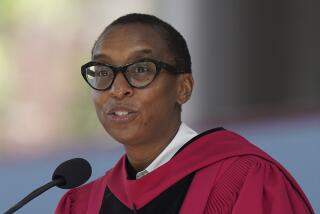No Justification for Plagiarism
- Share via
Stuart Green’s defense of historian Stephen Ambrose’s plagiarism makes the point that plagiarism is not synonymous with inaccuracy (Commentary, Jan. 13). He states that fellow historians have a right to censure Ambrose but dismisses that right with the statement that no one claims his books are inaccurate. This is a blase dismissal of a serious issue. Not every book is examined for errors. Errors may not be detected for years, and when detected the misinformation may be so popular that attempts to correct the information are ignored.
When a historian plagiarizes another writer we are denied the honesty of original research. If the first writer makes an error, the second one repeats it and less conscientious writers continue to repeat it until it is installed as the common view. Then teachers, opinion writers, editors and others who form public opinion base their views on it. Plagiarism may not be synonymous with inaccuracy but it will perpetuate it.
David J. Oliphant
Granada Hills
*
It is a disservice to serious scholars and students to dismiss Ambrose’s omissions as simple inaccuracies. It is not the reader’s job to ferret out which comments are the author’s or emanate from a list of references at the back of the book.
Donald A. Eisner
Encino
*
Remember, if you borrow from one person it’s plagiarism; if you borrow from several it’s called research. I’m not quite sure who said that . . . then again, I may have thought of it myself. Right! I’ll take the credit. Thank you.
Gary Keene
Mission Viejo
More to Read
Sign up for our Book Club newsletter
Get the latest news, events and more from the Los Angeles Times Book Club, and help us get L.A. reading and talking.
You may occasionally receive promotional content from the Los Angeles Times.









